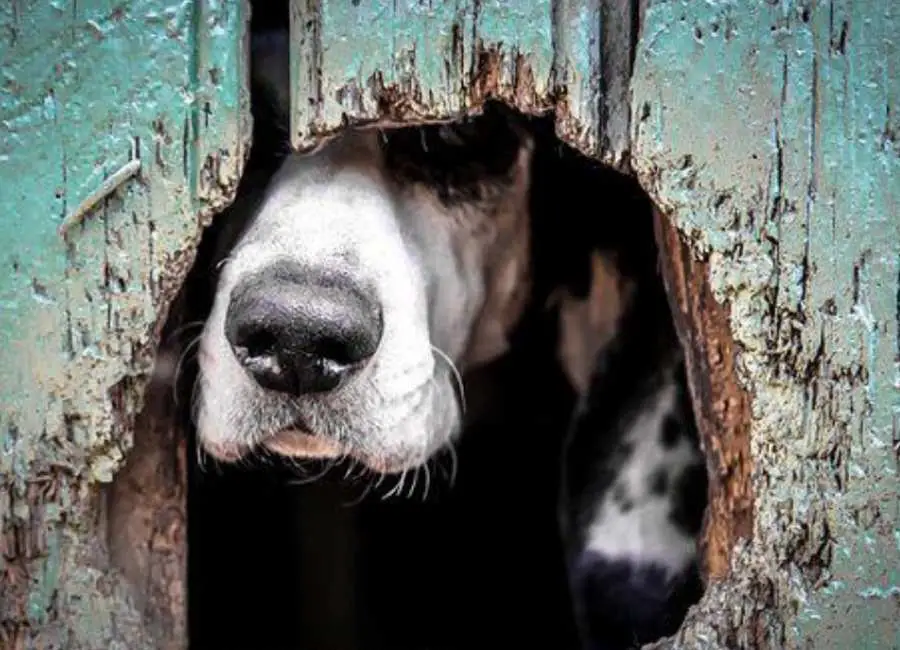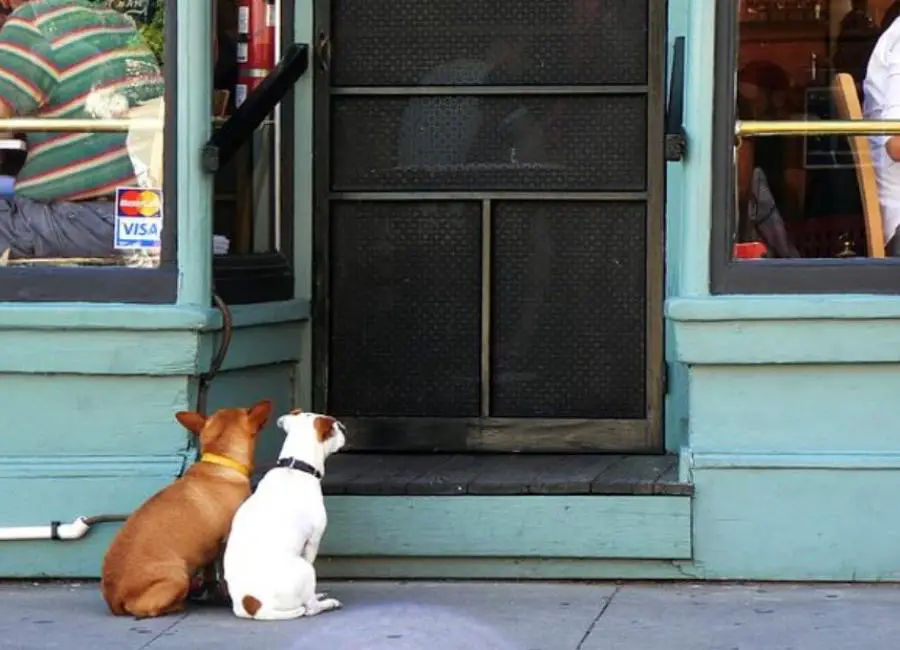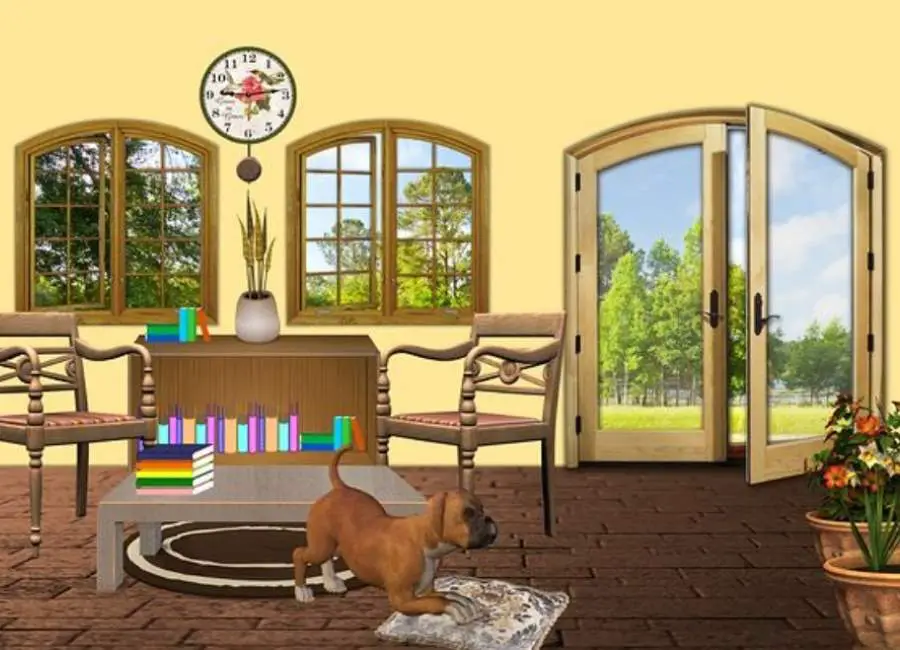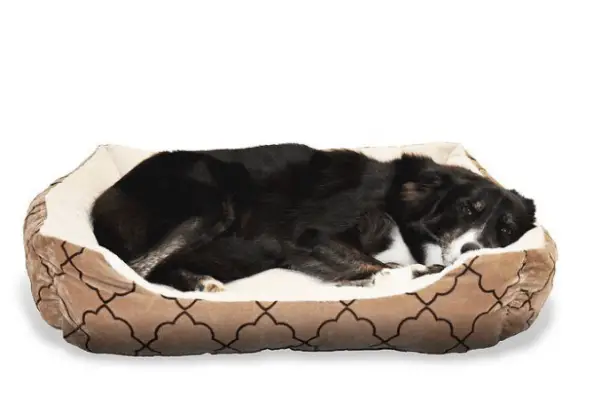10 Reasons Why Dogs Scratch Carpets And Walls (Explained)

There are lots of reasons why dogs scratch carpets and walls which we will be discussing in this post so keep reading!
Cats are known to scratch furniture more than dogs, therefore when a dog starts scratching carpets, walls, or doors something is definitely wrong.
Therefore, we will be looking at the most common reasons why dogs scratch carpets and walls.
We will also look at some common ways to control or prevent your dogs from scratching carpet or walls.
Reason Dogs Scratch Carpets And Walls

Here are some of the most common reasons why dogs scratch carpets and walls you should know:
1. To relieve stress
Stress is one of the most common reasons why dogs scratch carpets and walls which can be noticeable to their owners.
When dogs are overly stressed they tend to find a way of relieving themselves such as scratching carpets, walls, and doors as well as chewing valuables.
There are lots of things that can be seen as stress by dogs which include the following:
- Sounds of gunshots.
- Changing mealtimes.
- Moving to a new house.
- Changes in your home settings.
- Continuous changing of daily routine.
- Shouting at your dog.
- Continuous changing of diet.
- Lack of mental stimulation activities, etc.
All these can lead to stress which could lead to your dog scratching carpets or walls to relieve itself.
2. Curiosity
Curiosity is another common reason why dogs scratch carpets and walls just to find out what is going on.
Particularly if you have a hunting dog, one typical reason for wall scratching is that your dog has picked up on rodents or insects in the walls.
Your dog may be able to hear activity in your walls even while you are unable to.
The chance that your dog has detected anything is supported by head tilting, barking, whining, looking at the wall, snarling, and smelling the wall.
If your dog exhibits these tendencies, it might be time to look more closely at your carpet or walls.
To determine whether you can address the issue, you may attempt listening on your own or calling pest control services.
3. Anxiety

Anxiety is one of the most common problems dog owners have with their dogs, especially separation anxiety.
Separation anxiety can cause a dog to scratch furniture, doors, walls, or even chew things he is not supposed to chew.
There are many causes of separation anxiety in dogs but one of the most common is the fear of being left alone at home which your dog faces.
There are also different ways of preventing separation anxiety in dogs, again scratching carpets and walls can be a sign of separation anxiety in dogs.
4. Boredom
Being bored at any time is a serious issue for most dogs especially high-energy dogs like border collies.
When dogs are bored they create work for themselves and this can include scratching carpets and walls to stay busy.
It could also include chewing things and looking for anything to keep them busy at any cost.
Boredom in dogs can lead to lots of behavior issues such as increased aggression, whining, unnecessary barking, and biting behavior.
5. Lack of mental stimulation
Lack of mental stimulation activities or exercise can also be linked to why dogs scratch carpets and walls.
This is because when high-energy dogs are not getting enough mental stimulation to keep them active they tend to be destructive.
Almost all breed of dog needs some sort of mental stimulation activities and when they don’t get any this becomes an issue.
They scratch your walls and carpet as a way of getting relief or staying busy not knowing is not acceptable behavior.
6. Out of frustration
Frustration in dogs can lead to lots of behavior issues such as scratching carpets and walls, barking, biting, whining, etc.
A frustrated dog will always find a way of relieving itself and this might include scratching walls.
There are a lot of things that lead to dogs being frustrated and this includes:
- Give too many commands at a time to your dog.
- Changing your dog’s daily routine.
- Messing with your dog mealtimes.
- Coming back late from work.
- Shouting at your dog for doing wrong things.
- Beating your dog.
- Bringing home too many visitors, etc.
A frustrated dog can not only scratch carpets and walls but can also bite unnecessarily.
7. Wanting to go outdoors
Dogs scratch carpets and walls when they want to go outside, and this often happens when it’s time for you to walk your dog.
If you walk your dog daily, and your pup enjoys it, they may scratch the walls or doors to remind you it’s time to take a walk outside as usual.
When your dog scratches the wall on occasion, it can just be out of boredom and a desire to go outside.
Dogs have entertaining activities to do when they are bored, which include clawing carpets and walls.
But on occasion, it is to your canine partner. This could be a good way to kill some time.
In addition to scratching your walls, you could also notice them biting objects.
We are aware that it may be inconvenient. Therefore, it’s ideal to keep your dog busy to prevent this or keep to your walking time.
8. Releasing too much energy
Due to their high energy levels, pups are more likely to be hyperactive while they are young.
But after roughly 18 months, this hyperactive activity ought to stop.
Dogs who exhibit hyperactivity struggle to remain calm under any circumstance. Dogs that don’t get enough exercise may also go through this.
It’s because dogs that don’t get enough exercise build up excess energy. They’ll thus engage in activities to let it go. An illustration of it is scratching the walls.
Your dog, who is gnawing on the walls in this instance, might not pay attention to you. Particularly after you tell them to “Stop” or “No.”
Considering how energetic dogs sometimes disobey orders. Their primary goal will be to release surplus energy.
9. Seeking attention
Dogs can’t talk, yet they usually communicate well with us through body language and sound.
Unfortunately, they sometimes find it difficult to communicate, and they may resort to scratching at walls and carpets in order to do so.
Your dog may be scratching the wall in an effort to grab your attention or communicate a desire to you.
Your dog could need food or drink, but more often than not, they just need to go potty!
In particular, if they are clawing at or near the entrance, this is likely.
In the future, you can provide your dog with a more effective method of getting your attention, such as a bell.
You may simply take them out more frequently if that doesn’t work.
10. Health challenges
Unfortunately, health conditions like pica and cognitive dysfunction might contribute to a dog’s tendency to scratch walls.
Pica makes dogs consume a certain inedible object. But some people might eat many things.
Try to observe your dog’s wall-scratching behavior. Pica is evident if they scrape and then consume some of those bits.
Because of neurological issues or cognitive disorders, some dogs scratch walls.
Humans and dogs both have nervous systems that are comparable.
Additionally, neurological dysfunction happens when any of its components aren’t working properly.
Let’s now outline some common ways to stop or prevent dogs scratch carpets and walls.
Tips to why dogs scratch carpets and walls
Here are some common ways and activities that will help you stop your dog from scratching carpets and walls:
- Provide lots of mental stimulation activities for your dog.
- Find out the root cause of your dog scratching carpets and walls.
- Get many engaging and interactive toys for your dog.
- Take your dog for a walk once a day.
- Avoid changing your dog’s mealtimes and daily routine always.
- You can use a sound or spray deterrent if your dog insists on scratching the wall.
- Always keep your dog’s nails short.
- Properly exercise your dog to get out nervous energy.
- Improve your dog’s social life by increasing daily socialization.
- Introduce anti-scratching panels or guards.
- When dogs scratch carpets and walls don’t be mad at them.
- Spend time with your dog so that they feel safe and content.
- Avoid all forms of stress, anxiety, or boredom with your dog.
- Seek professional help.


![9 Best Dog For Duck Hunting [Explained] The Best Dog For Duck Hunting](https://petcreeks.com/wp-content/uploads/2021/04/The-Best-Dog-For-Duck-Hunting.jpg)



![Do Havanese Have Health Problems [Answered] Do Havanese Have Health Problems](https://petcreeks.com/wp-content/uploads/2023/02/Do-Havanese-Have-Health-Problems-768x555.jpg)